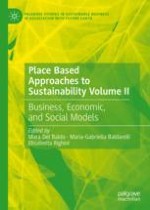Without respecting and nurturing ‘place’ we cannot achieve a state of ecological sustainability. Place-based organizations are not run on a purely materialistic basis. The non-materialistic features of a place, its aesthetics, cultural heritage, community feelings, transcendence, should be integrated into sustainability management. This far-reaching two-volume work breaks with the economic logic of efficiency and profit maximization, and suggests that organizations should inform their sustainability by encompassing feelings of identity with and attachment to place.
According to this vision, the editors have compiled scholarly contributions aimed to support the ecological transformation of humankind by exploring both theoretical and practical models that integrate the sense of the place, ethics and spirituality in new ways of organizing of economic and social life. This second volume takes the theoretical direction, established in the first model, and puts it into practice with cases from business and society. It will be of interest to scholars, practitioners and students of sustainability, business ethics and spirituality.
